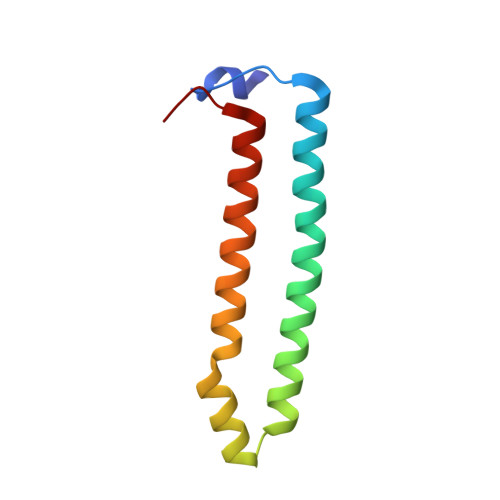Phage anti-CBASS protein simultaneously sequesters cyclic trinucleotides and dinucleotides.
Cao, X., Xiao, Y., Huiting, E., Cao, X., Li, D., Ren, J., Fedorova, I., Wang, H., Guan, L., Wang, Y., Li, L., Bondy-Denomy, J., Feng, Y.(2024) Mol Cell 84: 375-385.e7
- PubMed: 38103556
- DOI: https://doi.org/10.1016/j.molcel.2023.11.026
- Primary Citation of Related Structures:
8IXZ, 8IY0, 8IY1, 8IY2, 8J8O - PubMed Abstract:
Cyclic-oligonucleotide-based anti-phage signaling system (CBASS) is a common immune system that uses cyclic oligonucleotide signals to limit phage replication. In turn, phages encode anti-CBASS (Acb) proteins such as Acb2, which can sequester some cyclic dinucleotides (CDNs) and limit downstream effector activation. Here, we identified that Acb2 sequesters many CDNs produced by CBASS systems and inhibits stimulator of interferon genes (STING) activity in human cells. Surprisingly, the Acb2 hexamer also binds with high affinity to CBASS cyclic trinucleotides (CTNs) 3'3'3'-cyclic AMP-AMP-AMP and 3'3'3'-cAAG at a distinct site from CDNs. One Acb2 hexamer can simultaneously bind two CTNs and three CDNs. Phage-encoded Acb2 provides protection from type III-C CBASS that uses cA 3 signaling molecules. Moreover, phylogenetic analysis of >2,000 Acb2 homologs encoded by diverse phages and prophages revealed that most are expected to bind both CTNs and CDNs. Altogether, Acb2 sequesters nearly all known CBASS signaling molecules through two distinct binding pockets and therefore serves as a broad-spectrum inhibitor of cGAS-based immunity.
Organizational Affiliation:
Beijing Advanced Innovation Center for Soft Matter Science and Engineering, State Key Laboratory of Chemical Resource Engineering, College of Life Science and Technology, Beijing University of Chemical Technology, Beijing 100029, China.















